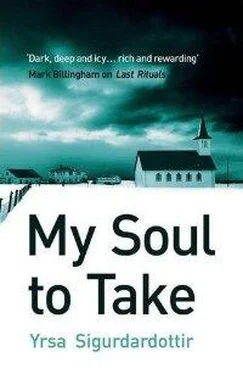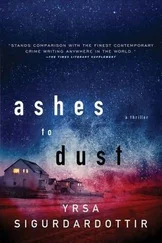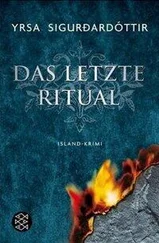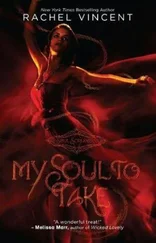“And did he?” asked Thóra. “Did he join the party and enlist people?”
“He started to, and he even made some progress.” Lára smiled again. “But it wasn’t the manifesto, the party, or the swastika that appealed to the young men who came here. It was Bjarni’s daughter, Gudný.”
“And you say she was a friend of yours?” said Thóra.
“Yes, she was. Friendship was very different back then, of course. We didn’t meet up as often as girls do these days. Even so, it was a genuine friendship; we couldn’t have been closer.” The old woman stared into the air, dreamy-eyed. “She was so beautiful—a beautiful little girl who turned into a beautiful young woman, just like her mother. As soon as she hit puberty, the local lads worshipped her, so they jumped at the chance to go around to her house, even if they had to pretend to be nationalists for the evening. I doubt they had a clue what Nazism was about. They just wanted to be near Gudný.”
“Was she at these meetings?”
“Oh, no, dear, but she did make the coffee and serve the refreshments. I used to help her sometimes. We’d make eyes at the boys and fall about laughing.” Lára’s eyes clouded and she shook her head sadly. “I don’t know how it would all have turned out, but fate intervened and what happened happened.”
“Do you mean tuberculosis?” asked Thóra.
“Among other things, yes,” she said. “Bjarni fell ill and locked himself away—and that meant Gudný did too.” She sighed. “I moved to Reykjavík with my aunt around that time, so I lost contact with her, apart from the occasional letter. The Nazi business fizzled out.”
“What do you think about the rumors that Bjarni abused Gudný?”
Lára looked directly at her. She exhaled briefly, then closed her eyes. “Goodness, that was a long time ago. Actually, I’ve been thinking about Gudný a lot recently.” She pointed at Sóldís, who was still beside her, rolling her gum around her mouth. “When Sóldís started working here, it brought it all back to me.” She hesitated for a moment, then looked firmly at Thóra. “I don’t believe Bjarni ever laid a finger on his daughter, either in anger or any other sin. For all his strange ways he was a good man, and I could tell from her letters that she loved him very much, so I simply can’t believe it.” She looked down. “Something did happen, though. Gudný’s letters became less frequent, but in her last one she confided to me that she’d had a baby. The letter was written just after her father had died, and the child was four years old. She said she hadn’t had the courage to tell me before. In those days that sort of thing was a great scandal. She would only have been sixteen when the baby was born. She never said a word about the father, but said she’d tell me the whole story later. She never got the chance, though, because the next thing I heard was that she’d died.”
“Who could have been the father,” Thóra asked, “if not her own father?”
“There weren’t many other candidates, that’s for sure,” Lára replied. “People were worried about TB, because it was so infectious and there was no cure at the time. The two of them were completely isolated after her father decided to stay at home instead of going to Reykjavík. She didn’t want to leave him, so that was that. The only person I know who called on them was Bjarni’s brother, Grímur. I’ve always suspected him of abusing Gudný, although I shouldn’t say such a thing when I have no real grounds except for the fact that he wasn’t a good man.”
“What happened to the child?” said Thóra. “Was it a boy or a girl?”
“A girl. I don’t know what happened to her, because no one seemed to know anything about her when I came back out here. The vicar who must have baptised her had just died, and the people I asked hadn’t noticed a little girl. A few of them had heard that Gudný ordered certain items that could only be explained by there being a baby at the farm. Rumor said the baby had died of exposure, or of TB like its mother. The incest story started circulating after Gudný and Bjarni were both dead. My efforts to locate the child might even have started the rumors.”
“Did you discuss this with Grímur?” asked Thóra.
“I tried, but he wouldn’t talk about it. He moved to Reykjavík not long after I came back here. No one wanted to help me get to the bottom of the matter because incest was such a taboo—there was so much shame attached to it.”
“Do you know the child’s name?”
“Kristín. She talked about little Kristín in her letter. I’ve searched everywhere for a gravestone with that name on it, but never found one, so I have no idea what became of her.”
“Kristín,” mused Thóra. “So she did exist.”
“Did?” said Lára. “I still cherish the hope that she’s alive. I’ve always believed that Gudný found a good home for her but kept it secret. She wouldn’t have wanted anyone to worry about catching TB from the child. That may have been what she had in mind from the time the child was born, and she could have asked Grímur not to send the birth certificate to the authorities, or to forge it somehow. I presume that Grímur delivered the baby, because it was born after everyone stopped calling on Gudný and her father.” Lára set her jaw. “My friend Gudný was a God-fearing girl. She wouldn’t have entertained the idea of the child not being buried in hallowed ground, if she had died. She would have been buried in the churchyard here, so I choose to believe that she lived.”
Thóra nodded. No mother in her right mind would bury a dead infant in the countryside when there was a cemetery nearby. Kristín must have survived her mother. Thóra did not want to tell Lára about the message that had been carved into the pillar, claiming that Kristín had been murdered. It was better for her to believe that she was still alive.
Thóra changed the subject. “Do you know what building stood out here at the back? It must have burned down a long time ago.”
“A building?” exclaimed Lára. “There was only one building there and it’s still standing, although it’s been incorporated into the hotel.” She wrinkled her brow in thought. “Unless you mean the barn,” she said suddenly. “Now that you mention it, I suppose it has gone.” She turned her head, looking for a window on to the land behind the hotel, but there wasn’t one. “On the other side of the farmhouse was a building that acted as a barn and a cattle shed. It might have burned down, but that would have happened before I came back, because I don’t remember a fire. I can’t say for sure if the building was still standing when I returned to the area.”
“I know this must sound odd, but do you remember anything special about the coal bunker at Kreppa?” Thóra asked. “It’s underground but can be reached both from inside the basement and through a hatch in the meadow.”
Lára screwed up her face as she considered it. “Not that I recall. Is it important?”
“What are that lot playing at?” said Sóldís suddenly, before Thóra could reply. “Don’t they know camping’s banned here? There’s a big sign at the highway exit. This is a protected nature reserve.”
“Oh, no.” Thóra sighed as she watched her SUV and trailer bunnyhopping into the hotel car park.
“The trailer stuck out well beyond the parking space. Thóra watched as Gylfi got out of the SUV and opened the doors for his little sister and Sigga, who were both sitting in the back. He had obviously not wanted the airbag to injure his unborn child if they had an accident. Gylfi certainly had his priorities right, if you ignored the fact that he had no driver’s license. Sigga arched her back as she got out, her swollen belly seeming more disproportionate than ever in contrast with her fragile frame. Thóra hoped for her sake that the child would not take after its father’s side of the family when it came to birth weight, because both Gylfi and Sóley had had heads the size of pumpkins when they were born. As she wondered how she could get rid of them, she remembered that it was ten in the evening—too late to arrange for a driver to collect them.
Читать дальше












